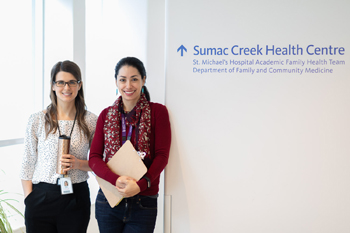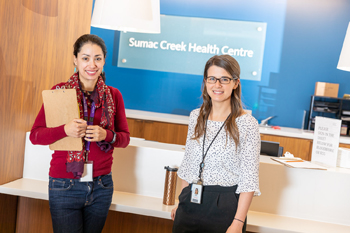Psychologists contribute to best care experience at St. Michael’s

By Emily Dawson
This February, Unity Health Toronto is celebrating Psychology Month and highlighting the role of psychologists at St. Michael’s Hospital. Psychology Month is celebrated across Canada to showcase the contributions of psychologists and build awareness of how psychology works to help people live healthy and happy lives.
Psychology is rooted in science and seeks to understand our thoughts, feelings and actions. At St. Michael’s, psychologists are essential members of our interprofessional teams and work closely with primary care doctors, nurses, social workers, case managers and other disciplines to provide multi-dimensional, holistic care.
The FOCUS Mental Health Team is an outreach program that provides care to adults experiencing mental health difficulties to support their recovery and quality of life in the community. The interprofessional team provides a range of services from substance use and finances to housing and legal issues – among many others.
“In my role, I primarily conduct comprehensive psychological assessments and facilitate individual or group-based therapies using a wide range of evidence-based treatments. I’m also involved in consulting, teaching, supervision, and research initiatives in collaboration with the team,” said Melissa Button, a Psychologist with FOCUS.
“The greatest benefits lie in our interprofessional approach, which takes the unique abilities, skills and expertise of each profession to promote a wider knowledge base and create cohesive care plans with our clients.”
Another critical success factor for Button and the FOCUS team is their practice of meaningfully engaging clients in their own care.
“We work collaboratively with clients to help them develop and learn effective skills that they can use in their day-to-day lives, acknowledging that recovery is a personal journey with goals set by the individual,” Button explained.
Evidence shows there are significant barriers to accessing consistent treatment for people experiencing disadvantage. Many FOCUS team clients are precariously housed or homeless, live under challenging conditions, have endured significant trauma, or struggle with stigma associated with mental illness.
“Because the people we work with can be difficult to reach, building therapeutic alliances often requires ample patience and creativity. Through sessions with Melissa, clients have the time and opportunity to steer the course of their recovery and actively participate in the development of their therapeutic plans. We are incredibly fortunate to have Melissa on our interprofessional team,” said Madeleine Ritts, Team Leader for the FOCUS team.
The Academic Family Health Team (FHT) is a six-site team with three mental health hubs. Like the FOCUS program, the FHT operates with an interprofessional model and psychologist Juliana Tobon is a key member of the team.
“I see patients across the lifespan. With younger children, I often support families with parenting skills, and I see children with anxiety, behavioural concerns, or who need additional learning supports. In adolescents, I see a lot of anxiety and depression. And in adults, I treat a lot of unresolved trauma and related concerns,” said Tobon.
“I work closely with social workers and with the Psychology Training Clinic (PTC) to review mental health referrals and triage them to the most appropriate service. Our team can address a wide range of concerns from physical to mental health to the social determinants of health.”
As a teaching hospital, St. Michael’s is also training the next generation of psychologists. Founded in 2011, the PTC is partnership between St. Michael’s and Ryerson University and is committed to providing evidence-based practice for underserved patients, teaching students in an interprofessional setting, and leveraging technology in patient care and student learning.
The importance of this PTC partnership is evident in a story Tobon shared about a patient referred to her for trauma-related issues.
“Because of the nature of the client’s concerns, it was a really lengthy assessment and diagnostic interview conducted through the PTC. This ended up being particularly positive for the patient because she finally felt heard and understood by the PTC student,” Tobon said.
“What was uncovered through this process helped the patient understand herself. From the get-go, it was a therapeutic experience.”
Tobon began counselling the patient and she’s greatly benefited from the engaging relationship they established.
“She’d had some negative experiences in the health system. In our therapeutic context, she was able to work through it and understand how her trauma had affected those encounters.
“We ended well in terms of the trauma symptoms. Being able to offer a full course of therapy on a weekly basis for someone who had this untreated trauma for years was really positive,” said Tobon.

Olivia Provost-Walker (photo courtesy of Provost-Walker)
Olivia Provost-Walker is a second-year student at Ryerson University in its joint Masters-PhD psychology program and is on a yearlong practicum in the PTC. Along with eight other students, Provost-Walker will be spending upwards of 500 hours in the PTC providing psychological services.
“In the PTC, we really focus on underserved clients, which aligns with my personal values. It’s a privilege to work with these clients and a special opportunity because it’s one of the only programs in Canada like this,” said Provost-Walker.
Provost-Walker admitted that making the leap from school – learning theories, symptoms and treatments – to the PTC was nerve-racking but has come with incredible benefits.
“My supervisors emphasize how important it is to just try to understand the person before anything else, and to be curious about their context, their current reality, and their background, rather than solely focusing on the symptoms,” she said.
“That’s one essential lesson that I’ll carry with me through my career – to put the whole person first and foremost in my practice.”
About St. Michael’s Hospital
St. Michael’s Hospital provides compassionate care to all who enter its doors. The hospital also provides outstanding medical education to future health care professionals in more than 27 academic disciplines. Critical care and trauma, heart disease, neurosurgery, diabetes, cancer care, care of the homeless and global health are among the Hospital’s recognized areas of expertise. Through the Keenan Research Centre and the Li Ka Shing International Healthcare Education Centre, which make up the Li Ka Shing Knowledge Institute, research and education at St. Michael’s Hospital are recognized and make an impact around the world. Founded in 1892, the hospital is fully affiliated with the University of Toronto.
About Unity Health Toronto
Unity Health Toronto, comprised of Providence Healthcare, St. Joseph’s Health Centre and St. Michael’s Hospital, works to advance the health of everyone in our urban communities and beyond. Our health network serves patients, residents and clients across the full spectrum of care, spanning primary care, secondary community care, tertiary and quaternary care services to post-acute through rehabilitation, palliative care and long-term care, while investing in world-class research and education. For more information, visit www.unityhealth.to.

